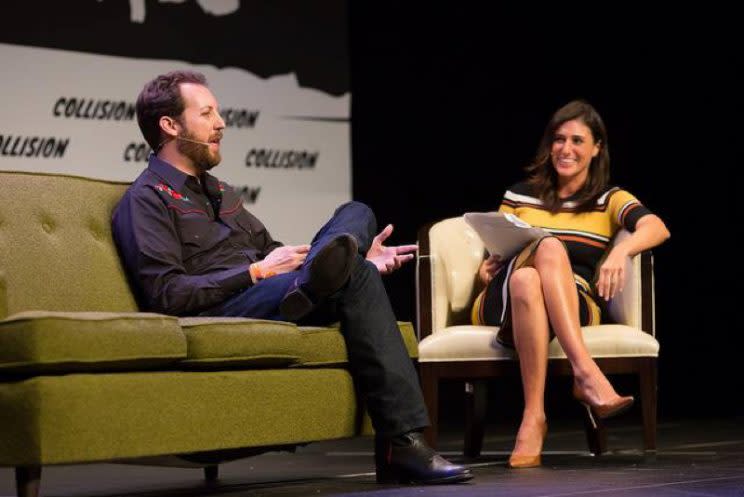These are the tech industry's 2 biggest concerns about Trump

NEW ORLEANS — Much of the Collision conference that wrapped up here Thursday was filled with the sort of optimistic banter about The Future you can hear at many other confabs. But part of it doubled as therapy for tech types anxious and angry over what President Trump and the Republican majorities supporting him in the House and the Senate might do to shape that future.
As investor Chris Sacca put it in a talk Wednesday afternoon: “I have a very sincere fear for the plight of the United States of America right now.”
In general, participants at Collision seemed largely concerned about two aspects of the Trump administration’s agenda: immigration reform and the ongoing battle over net neutrality. At the same time, Sacca and other speakers at the conference noted their own responsibilities for Trump’s election win.
Borders and Immigration
A panel Thursday afternoon on the importance of immigration to the tech industry pointed out some competitiveness the U.S. would face if officials make it harder for foreign-born techies to bring their talents here.
“I think we’re on the wrong side of the trend,” said Hired founder Matt Mickiewicz. “In Singapore, you can literally get a work permit in one week [….] By June of this year in Canada, you’ll be able to get a work permit in just two weeks.”
As a result, he observed later in the discussion, tech companies “are now hiring a lot more engineers in Canada.”
Another panelist, Aspect Ventures managing partner Theresia Gouw, predicted a cut in the number of H-1B visas, the relatively small number of work permits provided to foreign engineers hired by U.S. companies that say they can’t find enough qualified employees among citizens.
“We certainly won’t be getting more of them,” she said, calling out that category of visa as “a priority of this administration.”
(During the campaign, Trump pledged to “end forever the use of the H-1B as a cheap labor program”; in April, he signed an executive order supporting reform of that program.)
In a separate panel, Electronic Frontier Foundation executive director Cindy Cohn said that the civil-rights group planned to challenge another growing threat: Customs and Border Protection agents demanding that people arriving from overseas surrender their phones and even the passwords to them.
“We’re looking for a good test case,” she said — preferably a U.S. citizen subjected to this treatment.
Net neutrality
The swift moves by Trump’s newly appointed Federal Communications Commission Chairman Ajit Pai to undo the net-neutrality rules passed by the commission under President Obama were no more popular among Collision speakers.
“I was stunned at the way net neutrality and all of the things we have fought for in terms of the internet just got blown away,” Aspen Institute president and CEO Walter Isaacson said in an onstage interview Thursday. “We’ve had these massive changes in the past few weeks, and I just keep saying, ‘where’s the outrage?’”
Dozens of tech firms paid for exhibit space in the convention center here in the hope of getting attention from investors or journalists, and many of their services involve sending large amounts of data across the internet.
Without regulations banning internet providers from blocking or slowing sites or just charging them for priority delivery of their data to their subscribers, those firms could risk shakedowns from internet providers. As Isaacson put it, “Half the companies trying to start-up in that hall are going to have problems if you eliminate net neutrality.”
Lessons learned?
The Trump talk wasn’t all gloom and rage. Some speakers observed that they’d had some long looks into the mirror to see what they’d missed.
In the immigration panel, Felicis Ventures founder Aydin Senkut said his firm had been working to broaden where it invests in startups: “We’re trying to back a lot more companies in cities that are not Silicon Valley, New York, and L.A.”
When asked how much responsibility the tech industry bore for Trump’s use of Twitter as a megaphone, Sacca pled guilty on behalf of the business for ignoring the possibility of abuse.
“I think we have all of the responsibility,” he said. “I think generally we’re naive.”
In a talk that closed out the conference, Reddit founder Alexis Ohanian noted two memes that had trended across different parts of the Internet: people protesting Trump’s travel ban, and a FedEx guy rescuing an American flag about to be burned.
He noted that only the first got any discussion among people in his orbit, while the second drew a comparable amount of attention without his notice at the time.
“We have gotten really, really good at seeking out things that we enjoy,” he said. But that triumph of personalized Internet culture has inflicted a cost: “It’s given us these blind spots.”
More from Rob:
Email Rob at [email protected]; follow him on Twitter at @robpegoraro.
